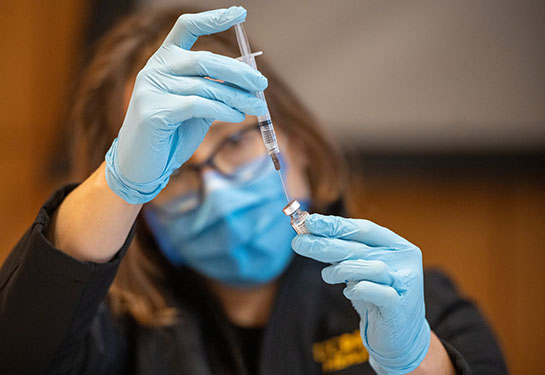COVID-19
UC Davis Health is committed to providing the most effective care for people with COVID-19. We base our treatments on the latest advances in research.
Medically reviewed by Dean Blumberg, M.D. on July 17, 2023.

What Is COVID-19 (Coronavirus)?
COVID-19 (also called coronavirus) is an infectious disease. People with COVID-19 usually have respiratory symptoms similar to a cold or flu. While most recover completely, some people experience serious and life-threatening symptoms.
UC Davis offers the latest treatments for COVID-19. Our Post-COVID-19 Clinic also treats people who have symptoms more than 30 days after their initial illness, known as long COVID.
COVID-19 Symptoms
Some people with COVID-19 have no symptoms. Others have symptoms that range from mild to life-threatening.
Common Symptoms
Symptoms of COVID-19 include:
- Muscle or body aches
- Chills
- Cough and congestion
- Diarrhea
- Fatigue
- Fever
- New loss of taste or smell
- Nausea or vomiting
- Sore throat
Emergency Symptoms
Seek immediate help if you have any of the following symptoms:
- Chest pain or pressure
- Confusion
- Difficulty breathing
- Skin that turns blue or gray
Causes and Risk Factors of COVID-19
A strain of coronavirus called SARS-CoV-2 virus causes COVID-19. SARS stands for severe acute respiratory syndrome.
You may be at increased risk for severe COVID-19 infection if you have any of the following risk factors:
Age
People older than 50 are more likely to become severely ill and need hospitalization for COVID-19.
Cancer
People with a history of cancer or who are undergoing cancer treatment have an increased risk of severe infection. Many cancer treatments can weaken your immune system and make it harder for your body to fight the virus.
Chronic Illnesses
Cystic Fibrosis
Cystic fibrosis is a genetic condition that affects your lungs. This condition puts you more at risk for severe symptoms of COVID-19.
Diabetes
People with a history of type 1 or type 2 diabetes are more likely to develop serious complications from COVID-19.
Heart Conditions
Heart failure, coronary artery disease (CAD), high blood pressure (hypertension) and other heart conditions are associated with severe COVID-19 infection.
Weakened Immune System
People with weakened immune systems due to an underlying medical condition or treatment have a higher risk of serious complications from COVID-19.
COVID-19 Testing
We recommend a COVID-19 test if you have symptoms of infection or have recent exposure to the virus. There are three types of tests:
- Antibody test: This test checks a sample of your blood for COVID-19 antibodies. Your immune system creates antibodies during an infection. If COVID-19 antibodies are detected, it means you were previously infected and/or vaccinated.
- PCR (polymerase chain reaction) test: A medical professional performs this nasal swab test. It detects SARS-CoV-2 genetic material. The PCR test is nearly 100% accurate.
- Rapid antigen test: This swab test can be performed by a medical professional or you can administer it yourself. Results are available within 15 minutes but can be less reliable than PCR tests.
If you’d like to be tested for COVID-19, you can contact a provider through UC Davis Express Care.
COVID-19 Treatments
Early treatment for COVID-19 can reduce your risk of severe illness. UC Davis Health offers a range of treatment options approved for children and adults. Your provider may recommend:
Antiviral Medications
Antiviral medicines like Paxlovid, Molnupiravir and Remdesivir help your body fight COVID-19 by preventing the virus from growing.
Respiratory Therapy
Pulmonary rehabilitation helps people who have trouble breathing because of COVID-19.
Steroid Medications
Corticosteroids are effective treatments for people experiencing severe illness.
Preventing COVID-19 Infection and Complications
You can take steps to protect yourself from getting infected with COVID-19. Certain actions also help prevent serious complications if you are infected. These include:
- Avoiding crowded indoor spaces
- Practicing physical distancing
- Staying up to date on your COVID-19 vaccines
- Seeking immediate treatment if you test positive for COVID-19
- Washing your hands regularly
- Wearing a mask
Symptoms can first appear
2-14Days after exposure to COVID-19 infection.
How many people have long COVID?
1 in 13U.S. adults have symptoms that last 3 or more months after COVID-19 infection
Request an Appointment
As Sacramento's No. 1 hospital, you'll benefit from unique advantages in primary care and specialty care. This includes prevention, diagnosis and treatment options from experts in 150 specialties.
Referring Physicians
To refer a patient, submit an electronic referral form or call.
800-4-UCDAVIS
Patients
Call to make an appointment.
Consumer Resource Center
800-2-UCDAVIS

Ranked among the nation’s best hospitals
A U.S. News & World Report best hospital in cardiology, heart & vascular surgery, diabetes & endocrinology, ENT, geriatrics, neurology & neurosurgery, and pulmonology & lung surgery.

Ranked among the nation’s best children’s hospitals
U.S. News & World Report ranked UC Davis Children’s Hospital among the best in pediatric nephrology, orthopedics*, and pulmonology & lung surgery. (*Together with Shriners Children’s Northern California)

Ranked Sacramento’s #1 hospital
Ranked Sacramento’s #1 hospital by U.S. News, and high-performing in aortic valve surgery, back surgery (spinal fusion), COPD, colon cancer surgery, diabetes, gynecological cancer surgery, heart arrhythmia, heart failure, kidney failure, leukemia, lymphoma & myeloma, lung cancer surgery, pacemaker implantation, pneumonia, prostate cancer surgery, stroke, TAVR, cancer, orthopedics, gastroenterology & GI surgery, and urology.

The nation’s highest nursing honor
UC Davis Medical Center has received Magnet® recognition, the nation’s highest honor for nursing excellence.

World-class cancer care
One of ~59 U.S. cancer centers designated “comprehensive” by the National Cancer Institute.

A leader in health care equality
For the 13th consecutive year, UC Davis Medical Center has been recognized as an LGBTQ+ Healthcare Equality Leader by the educational arm of America’s largest civil rights organization.

